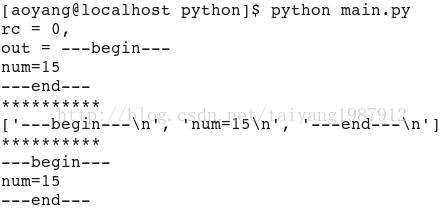
网络上资料 c/c++调用python 都是调用的脚本。我想问下python能不能直接编译出.so 然后c/c++直接link使用
版权声明:本文内容由阿里云实名注册用户自发贡献,版权归原作者所有,阿里云开发者社区不拥有其著作权,亦不承担相应法律责任。具体规则请查看《阿里云开发者社区用户服务协议》和《阿里云开发者社区知识产权保护指引》。如果您发现本社区中有涉嫌抄袭的内容,填写侵权投诉表单进行举报,一经查实,本社区将立刻删除涉嫌侵权内容。
C++可以调用Python脚本,那么就可以写一些Python的脚本接口供C++调用了,至少可以把Python当成文本形式的动态链接库, 需要的时候还可以改一改,只要不改变接口。缺点是C++的程序一旦编译好了,再改就没那么方便了。 (1)Python脚本:pytest.py #test function
def add(a,b):
print "in python function add"
print "a = " + str(a)
print "b = " + str(b)
print "ret = " + str(a+b)
return
def foo(a):
print "in python function foo"
print "a = " + str(a)
print "ret = " + str(a * a)
return
class guestlist:
def init(self):
print "aaaa"
def p():
print "bbbbb"
def getitem(self, id):
return "ccccc"
def update():
guest = guestlist()
print guest['aa']
#update()
(2)C++代码: /g++ -o callpy callpy.cpp -I/usr/include/python2.6 -L/usr/lib64/python2.6/config -lpython2.6/
#include <Python.h>
int main(int argc, char** argv)
{
// 初始化Python
//在使用Python系统前,必须使用Py_Initialize对其
//进行初始化。它会载入Python的内建模块并添加系统路
//径到模块搜索路径中。这个函数没有返回值,检查系统
//是否初始化成功需要使用Py_IsInitialized。
Py_Initialize();
// 检查初始化是否成功
if ( !Py_IsInitialized() ) {
return -1;
}
// 添加当前路径
//把输入的字符串作为Python代码直接运行,返回0
//表示成功,-1表示有错。大多时候错误都是因为字符串
//中有语法错误。
PyRun_SimpleString("import sys");
PyRun_SimpleString("print '---import sys---'");
PyRun_SimpleString("sys.path.append('./')");
PyObject *pName,*pModule,*pDict,*pFunc,*pArgs;
// 载入名为pytest的脚本
pName = PyString_FromString("pytest");
pModule = PyImport_Import(pName);
if ( !pModule ) {
printf("can't find pytest.py");
getchar();
return -1;
}
pDict = PyModule_GetDict(pModule);
if ( !pDict ) {
return -1;
}
// 找出函数名为add的函数
printf("----------------------\n");
pFunc = PyDict_GetItemString(pDict, "add");
if ( !pFunc || !PyCallable_Check(pFunc) ) {
printf("can't find function [add]");
getchar();
return -1;
}
// 参数进栈
*pArgs;
pArgs = PyTuple_New(2);
// PyObject* Py_BuildValue(char *format, ...)
// 把C++的变量转换成一个Python对象。当需要从
// C++传递变量到Python时,就会使用这个函数。此函数
// 有点类似C的printf,但格式不同。常用的格式有
// s 表示字符串,
// i 表示整型变量,
// f 表示浮点数,
// O 表示一个Python对象。
PyTuple_SetItem(pArgs, 0, Py_BuildValue("l",3));
PyTuple_SetItem(pArgs, 1, Py_BuildValue("l",4));
// 调用Python函数
PyObject_CallObject(pFunc, pArgs);
//下面这段是查找函数foo 并执行foo
printf("----------------------\n");
pFunc = PyDict_GetItemString(pDict, "foo");
if ( !pFunc || !PyCallable_Check(pFunc) ) {
printf("can't find function [foo]");
getchar();
return -1;
}
pArgs = PyTuple_New(1);
PyTuple_SetItem(pArgs, 0, Py_BuildValue("l",2));
PyObject_CallObject(pFunc, pArgs);
printf("----------------------\n");
pFunc = PyDict_GetItemString(pDict, "update");
if ( !pFunc || !PyCallable_Check(pFunc) ) {
printf("can't find function [update]");
getchar();
return -1;
}
pArgs = PyTuple_New(0);
PyTuple_SetItem(pArgs, 0, Py_BuildValue(""));
PyObject_CallObject(pFunc, pArgs);
Py_DECREF(pName);
Py_DECREF(pArgs);
Py_DECREF(pModule);
// 关闭Python
Py_Finalize();
return 0;
}
(3)C++编译成二进制可执行文件:g++ -o callpy callpy.cpp -I/usr/include/python2.6 -L/usr/lib64/python2.6/config -lpython2.6,编译选项需要手动指定Python的include路径和链接接路径(Python版本号根据具体情况而定)。
(4)运行结果:  转载于:https://www.cnblogs.com/apexchu/p/5015961.html
转载于:https://www.cnblogs.com/apexchu/p/5015961.html